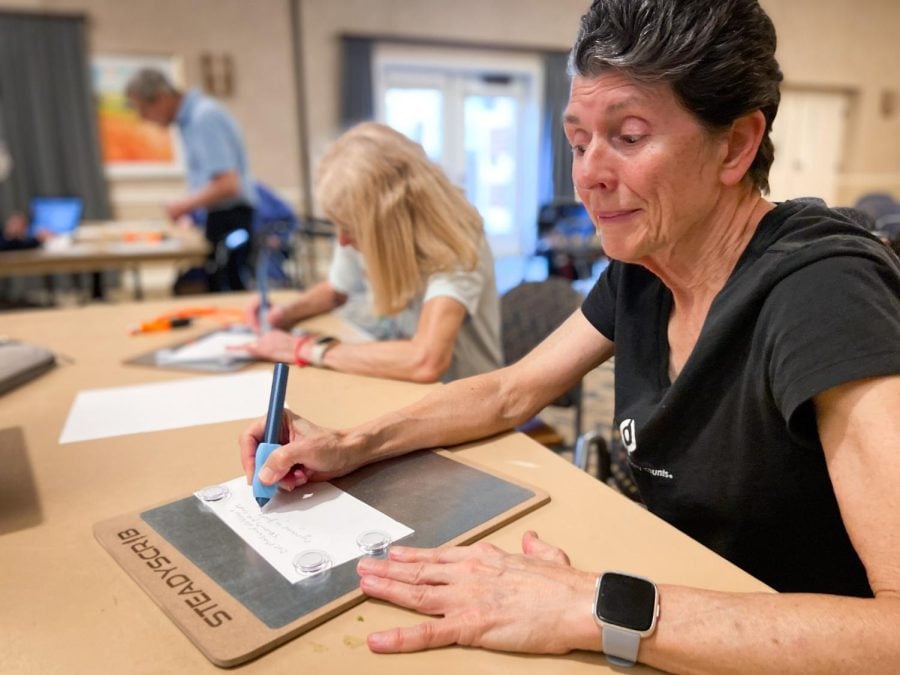NU juniors present SteadyScrib to local Parkinson’s support group
Cole Reynolds/The Daily Northwestern
Judy Freitag uses the StadyScrib at an Evanston Movers and Shakers event
April 17, 2023
Medill junior Izzy Mokotoff’s grandfather was a veterinarian by trade. But, she says, he was a writer at heart. She and her cousins received weekly handwritten letters from him growing up. When Mokotoff got into journalism school, she says her grandfather sent her old notes from his own college journalism assignments.
It’s through writing, Mokotoff said, that she and her grandfather built their relationship.
But in 2021, after battling Parkinson’s Disease for a decade, Mokotoff’s grandfather lost the ability to write. His handwritten letters stopped coming, she said.
“Not only functionally was that really devastating, but also from a sense of self and sense of identity” Mokotoff said. “Writing had always been such a huge part of who he was as a person.”
Mokotoff said she scoured every corner of the internet in search of a device that could restore her grandfather’s ability. She found nothing.
Almost two years later, over 900 people have signed up to buy the SteadyScrib, a stabilized writing kit developed by Mokotoff and McCormick junior Alexis Chan. It includes a magnetic clipboard and weighted pen, specifically designed to adjust to common Parkinson’s symptoms like tremors, bradykinesia and muscle rigidity. Mokotoff says the prototype is meant to help people with Parkinson’s, like her grandfather, recover not just their independence, but their sense of self.
Mokotoff and Chan brought their prototype to roughly 15 people at an Evanston Movers and Shakers event on Thursday. Participants wrote their names onto an email list and completed a series of drawing exercises. Most said they saw improvement in their ability.
“We’re hoping that with our innovation, we can sort of boost the confidence of those with Parkinson’s disease,” Mokotoff said. “We’re just hoping to make a little dent.”
SteadyScrib was born in an Alpha Phi bathroom. There, Mokotoff remembers venting her frustration about the lack of Parkinson’s writing implements to Chan, whose background is in biomedical engineering.
“I was just in disbelief that you couldn’t find something on Amazon,” Chan said Thursday while presenting a SteadyScrib prototype to the Evanston Movers and Shakers. “I just said, ‘Why don’t we do something about it?’”
With a $10,000 grant from Northwestern’s Jumpstart program via The Garage, Mokotoff and Chan developed the SteadyScrib. While initially Mokotoff handled the business and Chan built the prototype, Mokotoff says each learned the basics of the other’s specialty.
The first person to try the SteadyScrib was Mokotoff’s grandfather. She watched his hand grip the pen over Zoom, and said it was one of the most meaningful experiences of her life. But his feedback, like many early users’, was tepid.
Mokotoff says when she pressed users, she found their trepidation wasn’t because of the pen. She says many were embarrassed about needing it in the first place.
“It’s such a debilitating disease and, as a society, we aren’t as accommodating,” Mokotoff said. “To those with Parkinson’s, we make them feel like the other.”
Feeling stigma is common for people with Parkinson’s, especially those in its early stages, according to Judy Freitag, an ambassador for the Davis Phinney Foundation for Parkinson’s.
Freitag remembers feeling “isolated” and “disheartened” when her friends started avoiding her after she developed Parkinson’s symptoms. Chicago resident Howard Girovich tried to hide his symptoms for years before he could acknowledge them publicly.
Both Girovich and Freitag sampled the SteadyScrib on Thursday during the presentation to Evanston Movers and Shakers. Attendees also practiced writing checks, which Freitag said gives her particular trouble. Evanston resident Heather Wolens joked that she goes through many checkbooks because she has to throw so many illegible checks away. Freitag said being able to write checks and other everyday things could be a way to lessen the stigma of Parkinson’s.
“When you slowly lose your ability, when there’s a device like (SteadyScrib), it makes you feel like you’ve regained it,” she said.
Email: [email protected]
Twitter: @charcole27
Related Stories:
— Northwestern researchers develop milestone Parkinson’s treatment
— NU given $2.1M to fund new Parkinson’s research
— Students connect with Northwestern-based startups at The Garage’s Startup Matchmaking Event












